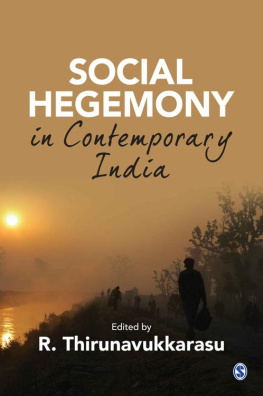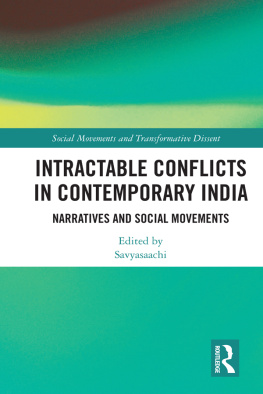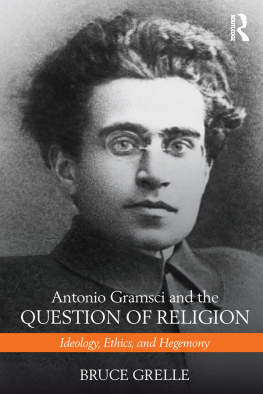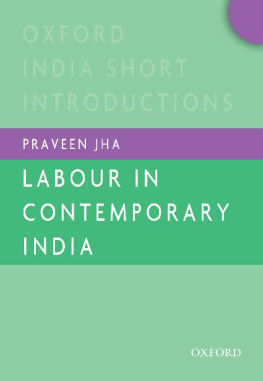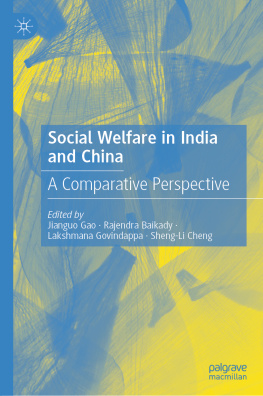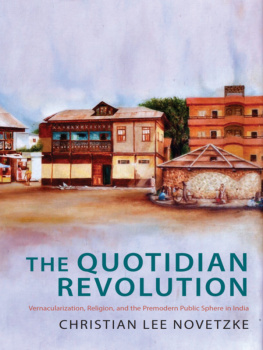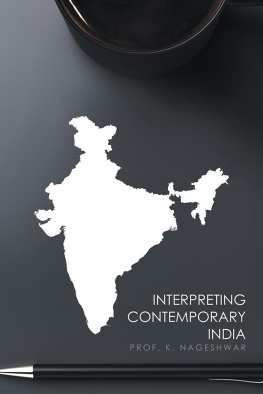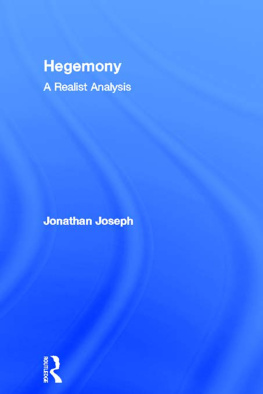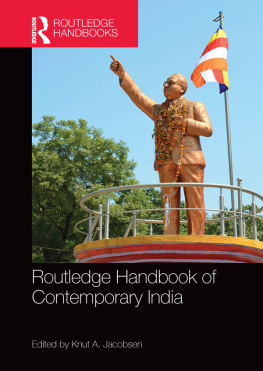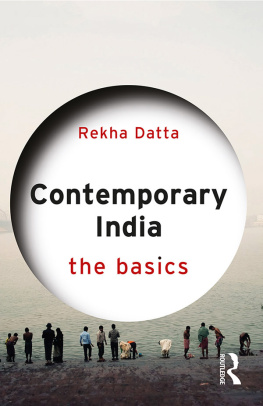R. Thirunavukkarasu - Social Hegemony in Contemporary India
Here you can read online R. Thirunavukkarasu - Social Hegemony in Contemporary India full text of the book (entire story) in english for free. Download pdf and epub, get meaning, cover and reviews about this ebook. year: 2020, publisher: SAGE Publications, genre: Politics. Description of the work, (preface) as well as reviews are available. Best literature library LitArk.com created for fans of good reading and offers a wide selection of genres:
Romance novel
Science fiction
Adventure
Detective
Science
History
Home and family
Prose
Art
Politics
Computer
Non-fiction
Religion
Business
Children
Humor
Choose a favorite category and find really read worthwhile books. Enjoy immersion in the world of imagination, feel the emotions of the characters or learn something new for yourself, make an fascinating discovery.
- Book:Social Hegemony in Contemporary India
- Author:
- Publisher:SAGE Publications
- Genre:
- Year:2020
- Rating:5 / 5
- Favourites:Add to favourites
- Your mark:
- 100
- 1
- 2
- 3
- 4
- 5
Social Hegemony in Contemporary India: summary, description and annotation
We offer to read an annotation, description, summary or preface (depends on what the author of the book "Social Hegemony in Contemporary India" wrote himself). If you haven't found the necessary information about the book — write in the comments, we will try to find it.
Social Hegemony in Contemporary India — read online for free the complete book (whole text) full work
Below is the text of the book, divided by pages. System saving the place of the last page read, allows you to conveniently read the book "Social Hegemony in Contemporary India" online for free, without having to search again every time where you left off. Put a bookmark, and you can go to the page where you finished reading at any time.
Font size:
Interval:
Bookmark:
SAGE was founded in 1965 by Sara Miller McCune to support the dissemination of usable knowledge by publishing innovative and high-quality research and teaching content. Today, we publish over 900 journals, including those of more than 400 learned societies, more than 800 new books per year, and a growing range of library products including archives, data, case studies, reports, and video. SAGE remains majority-owned by our founder, and after Sara's lifetime will become owned by a charitable trust that secures our continued independence.
Los Angeles | London | New Delhi | Singapore | Washington DC | Melbourne
Edited by
- R. Thirunavukkarasu

CopyrightR. Thirunavukkarasu, 2021
All rights reserved. No part of this book may be reproduced or utilised in any form or by any means, electronic or mechanical, including photocopying, recording, or by any information storage or retrieval system, without permission in writing from the publisher.
First published in 2021 by

SAGE Publications India Pvt Ltd
B1/I-1 Mohan Cooperative Industrial Area
Mathura Road, New Delhi 110 044, India
www.sagepub.in
SAGE Publications Inc
2455 Teller Road
Thousand Oaks, California 91320, USA
SAGE Publications Ltd
1 Oliver's Yard, 55 City Road
London EC1Y 1SP, United Kingdom
SAGE Publications Asia-Pacific Pte Ltd
18 Cross Street #10-10/11/12
China Square Central
Singapore 048423
Published by Vivek Mehra for SAGE Publications India Pvt Ltd. Typeset in 10.5/13 pt Bembo by AG Infographics, Delhi.
Library of Congress Control Number: 2020950794
ISBN: 978-93-5388-634-9 (ePub)
SAGE Team: Rajesh Dey, Satvinder Kaur and Rajinder Kaur
To
The American College, Madurai, Tamil Nadu
and
Jawaharlal Nehru University, New Delhi,
finest institutions of higher learning
for their impeccable commitment
to liberal education and egalitarian values
Thank you for choosing a SAGE product!
If you have any comment, observation or feedback, I would like to personally hear from you.
Please write to me atcontactceo@sagepub.in
Vivek Mehra, Managing Director and CEO, SAGE India.
SAGE India offers special discounts
for purchase of books in bulk.
We also make available special imprints
and excerpts from our books on demand.
For orders and enquiries, write to us at
Marketing Department
SAGE Publications India Pvt Ltd
B1/I-1, Mohan Cooperative Industrial Area
Mathura Road, Post Bag 7
New Delhi 110044, India
E-mail us atmarketing@sagepub.in
Subscribe to our mailing list
Write tomarketing@sagepub.in
This book is also available as an e-book.
- R. Thirunavukkarasu
- T. K. Oommen
- Amiya Kumar Das
- Tanweer Fazal
- R. Thirunavukkarasu
- Shaileshkumar Darokar
- Karthick Ram Manoharan
- Archana Singh
- C. Jerome Samraj
- P. Ramajayam
- Manoj Kumar Jena
The idea of this volume emerged little before I joined the University of Hyderabad during the summer of 2014. I was associated with the Institute of Human Rights Education for a period of three years. Extensive travel in Tamil Nadu and later across the country and discussions with government school teachers and children from many states gave me an opportunity to assess the changing social, economic and political conditions of people who are not at all visible in our everyday glittering world of liberalization. I thank Henri Tiphagne, Executive Director of the Institute, for his encouragement. After joining the University of Hyderabad, this idea was further consolidated during my discussions with colleagues and students. When I was warmly asked by my colleague and UGC-SAP coordinator Professor Purendra Prasad to organize a seminar, I thought of expanding this idea further. Therefore, the first credit goes to him for facilitating the seminar by providing not only the required financial assistance but also enormous moral support. Discussions with my teachers Professor T. K. Oommen and Professor Avijit Pathak sharpened some of the ideas before I could finalize the larger theme of the seminar. I thank them for their profound insights and constant encouragement.
Sixteen scholars were invited to make their presentation during the two-day event. However, some could not send their papers. Compiling all these papers was not a simple job as it involved several rounds of persuasive mails and text messages before these were finally consolidated. I thank them all for their scholarly inputs. I also thank all my colleagues at the Department of Sociology for their support and encouragement, especially Dr Janardhan, whose profound theoretical insights have helped me comprehend some of the complexities of the neoliberal economic order. Some of my ideas were refined during the discussions with my students in the class. I thank them for their insightful questions. This process received momentum when Abhijit Baroi from SAGE Publications gave me the necessary impetus. But if it was not for his constant encouragement, I am sure this project may not have fructified. I am grateful to him, later Rajesh Dey, and his team for the timely and enthusiastic support for this volume. My family members support always remains a great energizing factor. To simply say thank you obviously seems far less than adequate.
R. Thirunavukkarasu
A little more than half a century ago, Selig Harrison characterized the late 1950s and early 1960s as the era of the most dangerous time for India, as the nascent post-colonial country struggled to wade through some of its most tumultuous moments. His assessment, naive though, latches its faith on the robust linguistic assertion across the country, which he foresaw would precipitate the country moving towards a despotic political condition. Harrison actually believed that the political leadership at that time was too impatient, incapable of leading the country to embrace liberal political values and may be keen on obliterating conflicts rather than slogging to manufacture consensus.
Selig Harrison, India: The Most Dangerous Decades (Princeton, NJ: Princeton University Press, 1960).
Lloyd Rudolph, Review, India: The Most Dangerous Decades, Far Eastern Survey 29, no. 12 (1960): 191.
As a leading scholar on Indian politics and society, what Rudolph surmised was vindicated by the events in the country since the 1960s. The country remains the largest democracy in the world with elections regularly conducted by a statutory body; the judiciary resolutely remains independent and the media largely enjoys its freedom. All these virtues would be construed to declare that the country is indeed an envious political success story among many post-colonial countries especially in South Asia. But what is quite intriguing is the larger unanswered question: Could all these achievements in the political realm embolden us to declare that we have ensured liberty and justice to all our citizens? This question looks uncomplicated but evades a meaningful and precise answer.
Font size:
Interval:
Bookmark:
Similar books «Social Hegemony in Contemporary India»
Look at similar books to Social Hegemony in Contemporary India. We have selected literature similar in name and meaning in the hope of providing readers with more options to find new, interesting, not yet read works.
Discussion, reviews of the book Social Hegemony in Contemporary India and just readers' own opinions. Leave your comments, write what you think about the work, its meaning or the main characters. Specify what exactly you liked and what you didn't like, and why you think so.

